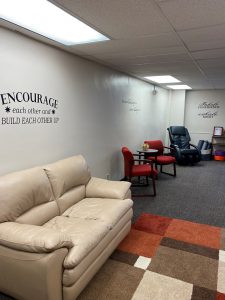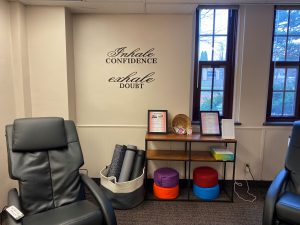
Shammah Bermudez, director of Disability and Student Services, cuts the ribbon on Mitchell Hamline’s new wellness center on Monday, May 2, 2022. Natalie Netzel ’15 (left) and Lynn LeMoine ’11 (right) are holding the ribbon.
In a continued effort to meet the needs of students, faculty, and staff, leaders at Mitchell Hamline on Monday cut the ribbon on a new wellness center.
“Law school for students and faculty and staff is necessarily and sometimes unnecessarily stressful,” said Professor Natalie Netzel ’15. “This is an investment for our people to be a place to just be.”
The remodeled suite of rooms features massage chairs; yoga mats; stress balls, acupuncture rings, and even coloring books; along with quiet rooms that can be used for meetings with counselors. It is open whenever the building is open and is located on the first floor on the east end of campus. The debut also correlated with the start of national #WellbeingWeekInLaw.

The new wellness center features places to relax, as well as messages of inspiration on the walls.
“This is also a commitment to mutual care,” added Netzel. “It’s not enough to just tell students to find time to take a walk or go for a run. We need to find places to provide care for each other.”
The center is the result of the Wellness Committee, Counseling Services, and Disability and Student Services offices hearing calls from students for more attention on mental health and well-being.
Netzel and Dean of Students Lynn LeMoine ‘11 have been at the forefront of a national movement to focus on the wellbeing needs of law students. “Law school has long been thought of as this ‘sink or swim’ place that’s purposefully hard because being an attorney is hard,” said LeMoine. “But it’s important to shift that paradigm because we know students and lawyers can thrive with the right systems of support.”
The two have worked to raise attention to the need for mutual care in legal education by presenting at the inaugural conference for the Institute for Well-Being in Law in January 2022. Netzel, LeMoine, and other Mitchell Hamline faculty and staff (Leanne Fuith, Kelli Simpson, Rick Petry, and Miriam Itzkowitz) are also slated to present at the AALS Section on Balance & Well-Being in Legal Education summer series on promoting well-being in law school.

The new wellness center also features two massage chairs, as well as yoga mats.
Netzel, who will take over as co-director of Mitchell Hamline’s clinics this summer, has taught a course twice on “Resilient Practice” for clinical students with Miriam Itzkowitz, a licensed social worker who is director of trauma-informed care for the Institute to Transform Child Protection.
“When our students get to work with clients in our clinics, it’s often with clients who are experiencing trauma,” said Itzkowitz. “It’s important we train future lawyers to be compassionate and effective with people who have experienced trauma without also encompassing that trauma as their own.”
Second-year student Hannah Burton took Netzel and Itzkowitz’s course this spring and attended Monday’s event at the wellness center. She said even with her own commitment to various wellness practices before law school, she has struggled to prioritize her mental health and well-being at Mitchell Hamline. “Law school is where we students develop the patterns we’ll carry into our legal practice—for better or worse. Having opportunities to take courses like Resilient Practice, or designating mutual care spaces like the wellness center, and seeing faculty who model healthy boundaries and take care of themselves can all contribute toward shifting the culture in law schools, and eventually, lead to changes across the legal profession.”
“As a student, it’s hard to heed the advice to take breaks and such,” added Grace Hoffman, also a second-year student who took the Resilient Practice course. “A wellness space will not cure all the ‘unwell’ parts of law school, but Mitchell Hamline’s creation of such a space may make it easier for students to heed that advice.”
